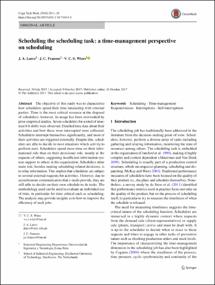| dc.contributor.author | Larco, José Antonio | |
| dc.contributor.author | Fransoo, J.C | |
| dc.contributor.author | Wiers, V.C.S. | |
| dc.date.accessioned | 2021-03-17T18:04:28Z | |
| dc.date.available | 2021-03-17T18:04:28Z | |
| dc.date.issued | 2017-10-28 | |
| dc.identifier.issn | 1435-5558 | es_PE |
| dc.identifier.uri | https://hdl.handle.net/20.500.12815/205 | |
| dc.description.abstract | The objective of this study was to characterize how schedulers spend their time interacting with external parties. Time is the most critical resource at the disposal of schedulers; however, its usage has been overlooked by prior empirical studies. Seven schedulers for a total of nineteen 8-h shifts were observed. Detailed time data about their activities and how these were interrupted were collected. Schedulers interrupt themselves significantly, and most of their activities are triggered externally. Despite this, schedulers are able to decide in most situations which activity to perform next. Schedulers spend more time on their informational role than on their decisional role, mostly at the requests of others, suggesting insufficient information system support to others in the organization. Schedulers other main role, besides making scheduling-related decisions, is to relay information. This implies that schedulers are subject to several external requests for activities. However, due to asynchronous communication that e-mails provide, they are still able to decide on their own schedule to do tasks. The methodology used can be used to evaluate an individual use of time, in particular for time critical such as scheduling. The analysis may provide insights as to how to improve the efficiency of such jobs. | es_PE |
| dc.format | application/pdf | es_PE |
| dc.language.iso | eng | es_PE |
| dc.publisher | Springer | es_PE |
| dc.rights | info:eu-repo/semantics/openAccess | es_PE |
| dc.rights.uri | http://creativecommons.org/licenses/by-nc-nd/4.0/ | * |
| dc.source | Repositorio Institucional UTEC | es_PE |
| dc.source | Universidad de Ingeniería y Tecnología - UTEC | es_PE |
| dc.subject | Computer applications | es_PE |
| dc.subject | Human computer interaction | es_PE |
| dc.subject | Asynchronous communication | es_PE |
| dc.subject | Critical resources | es_PE |
| dc.subject | Empirical studies | es_PE |
| dc.subject | Interruptions | es_PE |
| dc.subject | Relay information | es_PE |
| dc.subject | Responsiveness | es_PE |
| dc.subject | Self-interruption | es_PE |
| dc.subject | Time management | es_PE |
| dc.subject | Scheduling | es_PE |
| dc.title | Scheduling the scheduling task: a time-management perspective on scheduling | es_PE |
| dc.type | info:eu-repo/semantics/article | es_PE |
| dc.identifier.doi | https://doi.org/10.1007/s10111-017-0443-1 | es_PE |
| dc.identifier.journal | Cognition, Technology and Work | es_PE |


